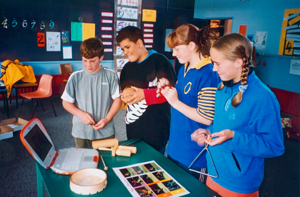![]() CHILDREN’S
ATTITUDES TO MUSIC: A BASELINE
CHILDREN’S
ATTITUDES TO MUSIC: A BASELINE
![]()
Roger Buckton
In
providing the first national survey of children’s attitudes
to and perceptions about music, the 1996 NEMP report on this area
of the National Curriculum provided very valuable baseline data
for music educators and researchers in New Zealand. It also included
information about children’s participation in music activities
in and out of school. This probe study took a close look at all
the music survey data obtained at the time of the NEMP music assessments,
not just that data documented in the 1996 report. |
During
the 1996 NEMP assessment, 500 randomly selected students at Year 4 and
Year 8 answered nine survey (Likert-type and open-ended) questions. These
related to the following: students’ attitudes to music inside and
outside of school; the amount of time they devoted to various music activities,
again inside and outside of school; their preferences for various types
of music-related activities; and their perceptions of their own abilities
in music.
| •
Music is a relatively popular school subject. Year 4 students ranked
it as their fourth most preferred subject out of 11 and Year 8 students
as their fifth. • The vast majority (80–86%) of students said they enjoyed music. • Year 4 students showed a stronger preference for a variety of musical activities (singing, playing and listening) than did Year 8 students. • A majority of students, according to their own perceptions, experienced very little classroom music. For example, 63% of the Year 4 sample said their most preferred musical activity in the classroom would be to play an instrument, yet only 25% indicated that they did this ‘lots’ or ‘quite often’ at school. |
•
The students appeared to react very positively to music in their own
time, and it was a significant activity for most of them, especially at Year 8 (88% versus 71% for Year 4). • Enjoyment, talent, accessibility and practice were all identified as factors in the reasons children gave as to why they saw themselves as good at particular musical activities.  |
![]()
